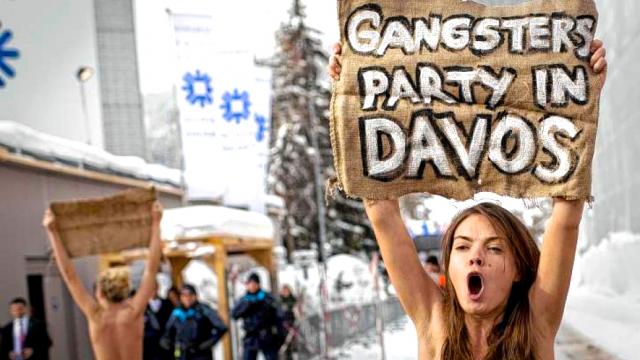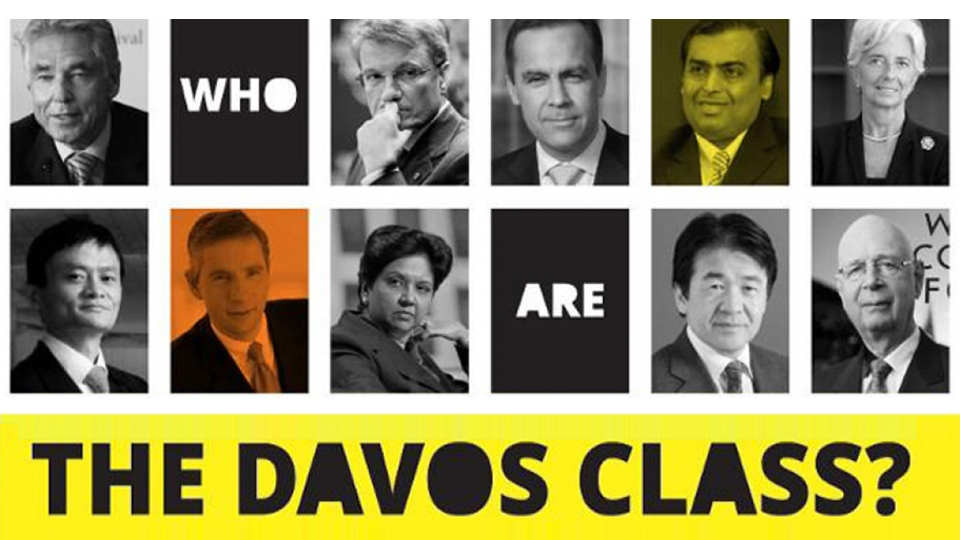
It’s an all-too-easy event to mock. It’s hard to keep a straight face when the world’s rich arrive annually in their private jets to the luxury ski-resort of Davos to express their deep concern about growing poverty, inequality and climate change. US comedian Jon Stewart has labelled the World Economic Forum (WEF) the ‘money oscars’ and lampooned the media’s giddy sycophantic coverage of the event; Bono, himself a regular at the summit, jokes that it is a summit of ‘fat cats in the snow’.
This year will be no different. 2500 corporate executives, politicians and a few Hollywood stars are expected to descend this week on Davos to discuss both the growing jitters about the faltering global economy as well as pontificate on the the official theme of the conference, namely the “fourth industrial revolution” (Think robots, AI and self-driving cars).
The real concern about the WEF, however, is not the personal hypocrisy of its privileged delegates. It is rather that this unaccountable invitation-only gathering is increasingly where global decisions are being taken and moreover is becoming the default form of global governance. There is considerable evidence that past WEFs have stimulated free trade agreements such as NAFTA as well helped rein in regulation of Wall Street in the aftermath of the financial crisis.
Less well known is the fact that WEF since 2009 has been working on an ambitious project called the Global Redesign Initiative, (GRI), which effectively proposes a transition away from intergovernmental decision-making towards a system of multi-stakeholder governance. In other words, by stealth, they are replacing a recognized model where we vote in governments who then negotiate treaties which are then ratified by our elected representatives with a model where a self-selected group of ‘stakeholders’make decisions on our behalf.
The result is that we are increasingly entering a world where gatherings such as Davos are not laughable billionaire playgrounds, but rather the future of global governance. It is nothing less than a silent global coup d’etat.Advocates of multi-stakeholder governance argue that governments and intergovernmental forums, such as the UN, are no longer efficient places for tackling increasingly complex global crises. The founder of WEF Klaus Schwab says “the sovereign state has become obsolete”. WEF has created 40 Global Agenda Councils and industry-sector bodies, with the belief these are the best groups of people to develop proposals and ultimately decisions related to a whole gamut of global issues from climate change to cybersecurity.
Corporations are put at the heart of this model, because they provide in the view of Klaus Schwab and corporate elites, the possibilities of“agile” governance, drawing on the private sector’s experience of “adapting to a new, fast-changing environment”. Governments are encouraged to tackle every issue by allying with private sector in public-private partnerships. And a few carefully selected civil society representatives are invited in to legitimize the process. Questions of how issues are framed, who is chosen, from what sectors, for whose benefit, and accountable to whom are brushed under the carpet.
An examination of the WEF’s board, is illustrative of the sort of elite groups that emerge as a result, given that WEF likes to see itself as a working model of this new multi-stakeholder world. WEF says that on its website that it is “accountable to all parts of society” carefully “blend[ing] and balanc[ing] the best of many kinds of organizations, from both the public and private sectors, international organizations and academic institutions.” But when only 6 of its 24 “exemplary” Board members are women (25%), 16 are from North America and Europe (67%), 22 of the 24 went to universities in US and Europe (10 in fact went to the same university, Harvard) and there is not one African Board member, it does raise questions about what they think accountability and representation looks like.
However its when you look at the careers of the Board members that the real driving force behind this model is clear. While half of the Board (12) are currently corporate executives, if you look at their career history, this rises to two-thirds. Only one member can be said to represent civil society (Peter Maurer of Red Cross). There are no representatives of trade unions, public sector organizations, human rights groups, peasant or indigenous organizations, students and youth.
It is therefore no surprise when multi-stakeholder policy groups rarely, if ever, recommend any binding regulations that would damage corporate profits. University of Massachusetts professor Harris Gleckman, who has closely studied GRI, says that one of its central tenets is that opt-in, voluntaristic approaches are the best way for tackling social and environmental issues. So codes of conduct become the norm, and international binding standards and regulations are rejected (except of course when it concerns facilitating trade in commerce and finance in which case legally enforceable protections for corporations are very welcome). In other words, corporations are free to pick and choose what they act onand not bound by any enforceable legislation that could control their social and environmental impact.
This elite-led model of governance is proliferating globally like a virulent rash. The World Water Forum, the Marine Stewardship Council and the Internet Corporation for Assigned Names and Numbers (ICANN) are just three of thousands of multi-stakeholder groups .They are becoming the default option for global governance, and there is nothing in international law to stop this. What WEF is trying to do is to turn these models into a multi-stakeholder governance system. As Harris Gleckman points out, “What is ingenious and disturbing is that the WEF multi-stakeholder governance proposal does not require approval or disapproval by any intergovernmental body. Absent any intergovernmental action the informal transition to multi-stakeholder governance as a partial replacement of multilateralism can just happen.”
This model is even having a growing impact on existing intergovernmental forums. The recent agreement at Paris COP21, so celebrated worldwide, is typical. Gone was any reference of binding agreements, such as the Kyoto Protocol agreed in 1997, or any attempt to tie actions to scientific advice let alone historic responsibility. Instead we got voluntary ‘promises’ of action (known as Intended Nationally Determined Contributions), a call for greater private sector involvement, and a commitment to try and do better in five years time.
The critical issue of food provides another example of what this shift towards corporate-led multistakeholderism can mean in practice. When food prices surged dramatically in 2007 to 2008, causing food riots and social unrest, a plethora of multi-stakeholder initiatives emerged in response. This included the Global Alliance for Improved Nutrition (GAIN), the African Green Revolution Association (AGRA), the UN Secretary-General’s High-Level Task Force on the Global Food Security Crisis (HLTF) and its parallel G8 public-private partnership (PPP) initiative, the Global Partnership for Agriculture and Food Security and the Scale Up Nutrition (SUN) initiative. They also included the WEF’s own Global Food, Agriculture and Nutrition Redesign Initiative (GFANRI).
The groups’ proposals all followed a similar very template - advocating for policies that liberalize trade, increase production, encourage corporate investment and help expand agroindustries control of food. They pointedly ignore issues of distribution and waste or the need for democratic access and control of land and food. Moreover these groups systematically sought to close down multilateral spaces, such as the UN Standing Committee on Nutrition (SCN), that actually examined these issues. No wonder, long-time food sovereignty activist, Flavio Vicente calls this corporate capture a “life grab” which “threatens the achievement of food sovereignty and the full emancipation of women.”
The result is that we are increasingly entering a world where gatherings such as Davos are not laughable billionaire playgrounds, but rather the future of global governance. It is nothing less than a silent global coup d’etat.
This article draws on themes explored in essays and infographics in Transnational Institute’s annual ‘State of Power’ report available at http://www.tni.org/stateofpower2016
3 WAYS TO SHOW YOUR SUPPORT
- Log in to post comments














